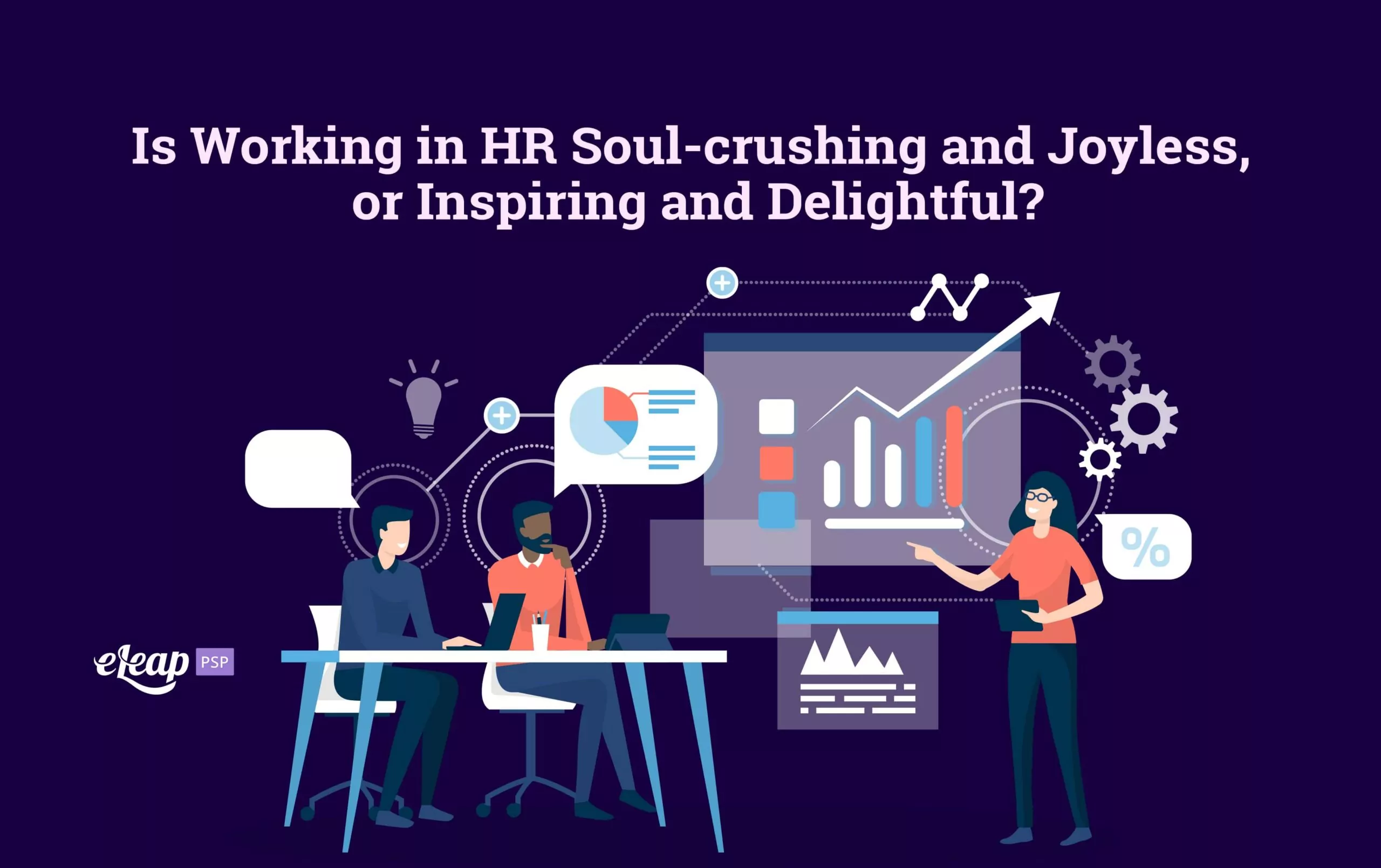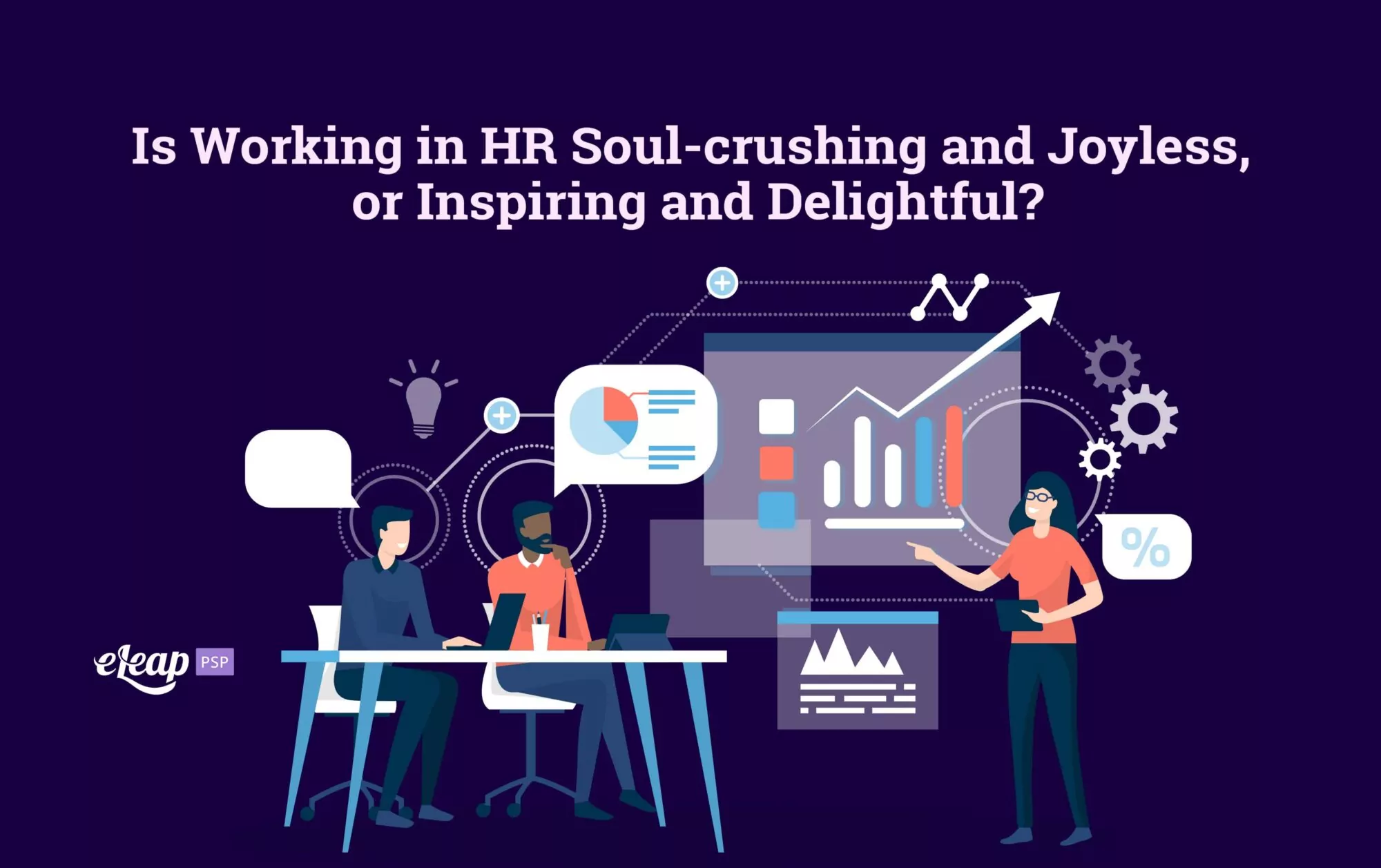Is Working in HR Soul-Crushing and Joyless, or Inspiring and Delightful?

Is working in Human Resources or more commonly known as HR, a career that leaves one feeling inspired and fulfilled or drained and disillusioned? This is a question that sparks heated debates in many circles, with passionate arguments on both sides. After going through the trauma of Covid, this issue has taken on even more poignancy.

To some, HR can be incredibly rewarding and fulfilling, while to others, a career in HR can be a highly demanding position that leaves its practitioners drained and burned out. To shed more light on this, some individuals recently shared their experience working in HR on Reddit. According to one HR director, some challenges they face include “navigating corporate politics, watching incompetent leaders consistently get promoted, and dodging unsolicited feedback.” Ouch.
In this article, we’ll dive deep into the world of HR to explore the real experiences of those in the field and uncover whether it’s truly a soul-crushing job or an inspiring and delightful one. Some might say it is a little bit of both.
Challenges That HR Professionals Face
Here are some of the more common challenges that HR professionals encounter in the course of carrying out their work:
Navigating Corporate Politics
Navigating corporate politics is a significant challenge for HR professionals as it involves managing relationships and interactions between different stakeholders within an organization. HR professionals are constantly needing to balance the needs of various stakeholders, manage conflicts, build alliances, negotiate resources, and maintain neutrality. These can be significant challenges to handle, especially for those working in large organizations. Some HR professionals on Reddit mentioned that they prefer working with startup companies or smaller organizations as these tend to have less politics than working with large organizations. Commenting on the Reddit thread about how soul-sucking it is working in HR, someone mentioned that he “felt that way working for large fortune 500s.” According to him, he “prefers working for smaller-mid size companies where there’s less politics and bureaucracy.”. Trying to manage even routine processes like performance evaluations, one-on-ones, or helping to set organization goals suddenly took on nebulous dimensions where it is easy to step on toes or worse.
They Take Care of Everyone but Themselves
One of the key responsibilities of HR is “to take care of everyone” in the organization, but HR professionals actually often get stressed doing this with no one to take care of them. This relates to the story of one HR professional on Reddit, who mentioned that “HR takes care of everyone, but who takes care of HR?” According to her, “we support the people & operations on a daily basis 24/7, but when we (HR) need support… crickets, crickets. We get scrutinized for any decision we make… I feel like I’m under a microscope constantly. And always having to be on the defense as I never know when I’ll get attacked or “stabbed” in the back.” This can be incredibly demoralizing.
Another HR professional with almost ten years of experience added that organizations always hold HR employees to a higher standard. They can’t get away with nearly any mishaps leaders or non-HR employees can. He said, “since Covid, we’ve all worked tirelessly to make sure there is no disruption for the organization or the employees. However, if HR needs help, there’s no one there. It feels like you have to suffer in silence and work through everything. I’m completely burnt out, and you don’t get a lot of sympathy from the business when you feel that way.”
Talent Retention
Talent retention is a significant challenge for HR as it involves retaining the organization’s most valuable asset, its employees. Employees have more options in a competitive job market. If they are not engaged, lack career growth opportunities, experience poor management, or receive inadequate compensation and benefits, they are more likely to leave. Being entrusted with such sensitive tasks can be significantly challenging. While HR professionals can seek out solutions like the eLeaP People Success Platform, it is essential that they get support and budget from top leadership to make these investments actually happen instead of only paying lip service to them. We know that ensuring alignment with organizational goals, providing transparency and peer reviews, incorporating frequent check-ins and one-on-ones, leveraging the feedback of employees, and offering learning and development resources go a long way to improving talent retention.
Leadership Development
According to ResearchGate, leadership development is a crucial challenge for HR. Leadership development is a critical strategic initiative needed for every organization to thrive. HR personnel are expected to provide the necessary tools, processes, and structures and be assertive enough to select and develop future leaders of the organization. They are expected to help employees discover their strengths and help them harness them to their advantage. However, some organizations have cultures which simply are not ready to change. The ‘this is the way we have always done things around here’ mentality is still quite pervasive in many corporates and nonprofits. It appears HR is constantly coming up with new ideas, and these are just getting shot down.
Stroking People’s Ego
This is a big challenge encountered by HR personnel. Employees have different backgrounds, experiences, and personalities; this means that their egos can vary. It, therefore, lies on the shoulders of HR personnel to understand what motivates each employee and their psychological needs. This can be a challenging and sensitive task to handle. In some situations, HR professionals get a lot of unsolicited feedback that may negatively affect their own motivation. HR is not a profession for anyone struggling with self-esteem issues. Someone commented about how he handles situations like this. He said, “Unsolicited feedback? If it comes from someone I respect, I listen to it. Anyone else, “thanks, I’ll certainly take that on board.”
Rewards of Working In HR
While there are many challenges working in HR, it is not all pain and suffering. HR can be an incredibly rewarding profession. Commenting on the Reddit thread, an HR executive mentioned that some companies care about their HR professionals and go out of their way to make it rewarding. He said, “I learned that every company has a different culture. Changing to a different employer might help.”
So just like we discussed earlier, sometimes even HR professionals need to jump ship to go to organizations where they are more likely to be more appreciated. Here are some of the benefits of working in human resources:
Potential To Earn An Above-Average Salary
According to the Bureau of Labor Statistics, the median annual salary for HR specialists was $63,490 in 2020. HR is a vital department in any organization. Therefore, it’s not surprising that its personnel are likely to earn above-average salaries within organizations.
Opportunity To Influence And Change Life
As an HR professional, your employees’ happiness and welfare are your professional responsibility. There are numerous ways in which HR personnel contribute to helping employees in need. Some of the ways HR has come through for employees is by offering a lifeline by employing someone who might be in danger of losing their home or by providing tuition reimbursement or health insurance to someone who might have never had it. Other ways include helping employees with training that will equip them with transferable skills regardless of where they work. Human resource personnel can advocate for policies that positively change employees’ lives. Such acts of helping others can give HR professionals a sense of happiness and fulfillment.
Opportunity To Bring Development To Your Subordinates
The work of a human resource manager entails the professional development of their subordinates. Utilizing tools like exit interviews and performance reviews, you can gather the information to help better understand how best to go about the performance improvement plans. This allows you to improve the way organizations and employees get along and thrive in today’s hyper-competitive landscape.
Gratification From Solving Problems
A professor at the University of Michigan Ross School of Business, Dave Ulrich, said: “HR professionals are emotional caregivers.” This is so as HR personnel are at the frontline; they provide resources for employees dealing with personal tragedy. HR professionals are expected to motivate teams and bring an upbeat perspective during difficult times. In fact, HR is supposed to have a kind of sixth sense to anticipate trouble before it arrives. While these can all feel overwhelming, there’s a tremendous sense of fulfillment that HR professionals also derive that they get the opportunity to genuinely make a difference in the lives of their team members and employees.
Opportunity To Serve As A Career Guide To Employees
Usually, employees, especially those just starting their careers, may not have a clear career direction or plan. HR professionals can guide these individuals and nudge them towards becoming the best they can be in their career paths. Employees look to their HR personnel as role models and trust their judgment on decisions they make for the organization or themselves. Being in this privileged position allows HR professionals to quite literally help mold the careers and life trajectory of many employees. Wow. What an amazing opportunity and responsibility.
Final Thoughts
Whether being in HR can be soul-crushing or fulfilling depends on one’s experiences and the organization one works for. While there are challenges in working in this demanding field, there are also significant rewards, including the opportunity to influence and change lives.
It is essential to approach your HR work with a realistic picture of the expectations and demands involved. Ultimately, with the appropriate approach and mindset, Human Resource professionals can discover purpose and find meaning in their work; after all, they get to make unforgettable and lasting impacts and differences in the lives of their employees.